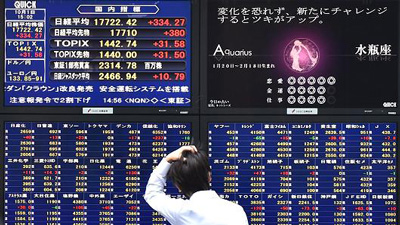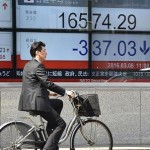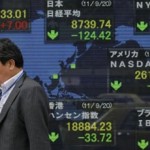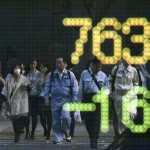Asian Stocks Advance Before Fed as Pound Halts Slide; Oil Sinks

-
Yuan hovers near five-year low after MSCI’s China ruling
-
Japanese bond yields drop to new records as copper gains
Asian shares rose, rebounding from the steepest selloff in global stocks since January, as currency markets stabilized ahead of the Federal Reserve’s policy review. The yuan traded near a five-year low after MSCI Inc. decided to keep Chinese equities out of its benchmark indexes.
The MSCI Asia Pacific Index gained for the first time in a week as Japan’s Topix rebounded from a two-month low. Shares in Shanghai reversed earlier losses, spurring speculation state-backed funds were supporting share prices. The British pound advanced, after sliding more than 1 percent in two of the last three trading sessions, and the yen held near its strongest level since 2014. Crude broke below $48 a barrel after a report showed U.S. stockpiles increased, while copper rose. Japanese bond yields plumbed new lows.

About $2.5 trillion was wiped off the value of global equities in the past week and the pound tumbled as a slew of polls showed growing support for Britain to leave the European Union ahead of a June 23 referendum. The vote is making investors wary before central banks in the U.S., Japan and the U.K. review monetary policy this week. MSCI, whose emerging-markets index is tracked by some $1.5 trillion of funds, said more improvement in access to China’s stock market was needed before the nation’s equities can be added to its benchmarks.
“While we get a bounce following the huge knockdown across markets, investors should probably sell into the strength ahead of the Brexit vote,” said Nicholas Teo, a trading strategist at KGI Fraser Securities Pte in Singapore. “There’s a lot of uncertainties out there. A statement from the Fed tonight may help calm the market, but concerns remain on the timing of the rate hike.”
The Fed is expected to keep the benchmark lending rate unchanged when its two-day policy meeting concludes in Washington, though the central bank’s statement and Chair Janet Yellen’s comments at a press briefing will be scrutinized for clues on the likely timing of the next increase. Futures indicate the odds of a move by July tumbled to 16 percent from 53 percent since the start of this month, damped by weak U.S. payrolls data and turbulence in global financial markets.
Stocks
The MSCI Asia Pacific Index rose 0.2 percent as of 1:49 p.m. Tokyo time, after sliding 4.4 percent over the last four sessions. Japan’s Topix climbed 0.4 percent as the yen snapped a three-day advance and Hong Kong’s Hang Seng Index gained 0.5 percent. Toshiba Corp. jumped as much as 8.7 percent in Tokyo as brokerages including CLSA Ltd. turned more positive on the stock.
The Shanghai Composite gained 1.5 percent, after earlier sliding as much as 1.1 percent following the MSCI decision. China’s benchmark is still down 18 percent for the year.
“It’s a sharp reversal so there has to be some government intervention,” said
Francis Lun, chief executive officer at Geo Securities Ltd. in Hong Kong. “The Chinese government never wants to see the market falling too much.”
Futures on the S&P 500 Index declined 0.1 percent, after the benchmark ended the last session at a three-week low. Contracts on the U.K.’s FTSE 100 Index advanced 0.2 percent, after the gauge closed below 6,000 for the first time since February.
Currencies
The yuan fell as much as 0.1 percent to a five-year low of 6.6047 a dollar in Shanghai, before trading little changed at 6.5945.
The pound strengthened 0.2 percent to $1.4135. It slid 1.1 percent on Tuesday after five opinion polls in two days put the ‘Leave’ campaign ahead of ‘Remain’ in the run-up to the EU vote and as Britain’s best-selling newspaper, The Sun, backed a withdrawal.
The yen was little changed, after rallying almost 1 percent over the past three sessions.
Commodities
West Texas Intermediate crude slipped 1.4 percent to $47.81 a barrel, falling for a fifth day to be set for its longest run of declines since February. Concern over a global glut in the commodity reemerged with the American Petroleum Institute reporting a 1.16 million-barrel increase in U.S. oil inventories for last week. Nigerian militants, whose attacks on oil infrastructure have sent the country’s output plunging to its lowest level in 27 years, also said for the first time they are considering peace talks.
Copper rose 1.3 percent in London, while nickel advanced for the first time in a week. Gold declined 0.1 percent, after surging 3.4 percent over the last five days.
Bonds
Yields on Japan’s benchmark government bonds were at record lows across tenors from two to 40 years. The rate on notes due in a decade fell to an unprecedented minus 0.19 percent, while 20-year and 30-year yields touched historic lows of 0.14 percent and 0.215 percent, respectively.
Ten-year U.S. Treasuries yielded 1.62 percent, after ending the last two sessions at 1.61 percent, the lowest closing level since 2012. The rate on similar-maturity German debt fell below zero on Tuesday for the first time as the U.K.’s potential exit from the EU fueled demand for haven assets.
Source: Bloomberg





























